Psychological villains are adept at using mind games and emotional manipulation to exert control over others, often exploiting their deepest fears and vulnerabilities. By recognizing their specific traits and common tactics, individuals can better defend themselves against such manipulative behaviors. Understanding these dynamics is crucial for fostering healthier relationships and maintaining personal boundaries.
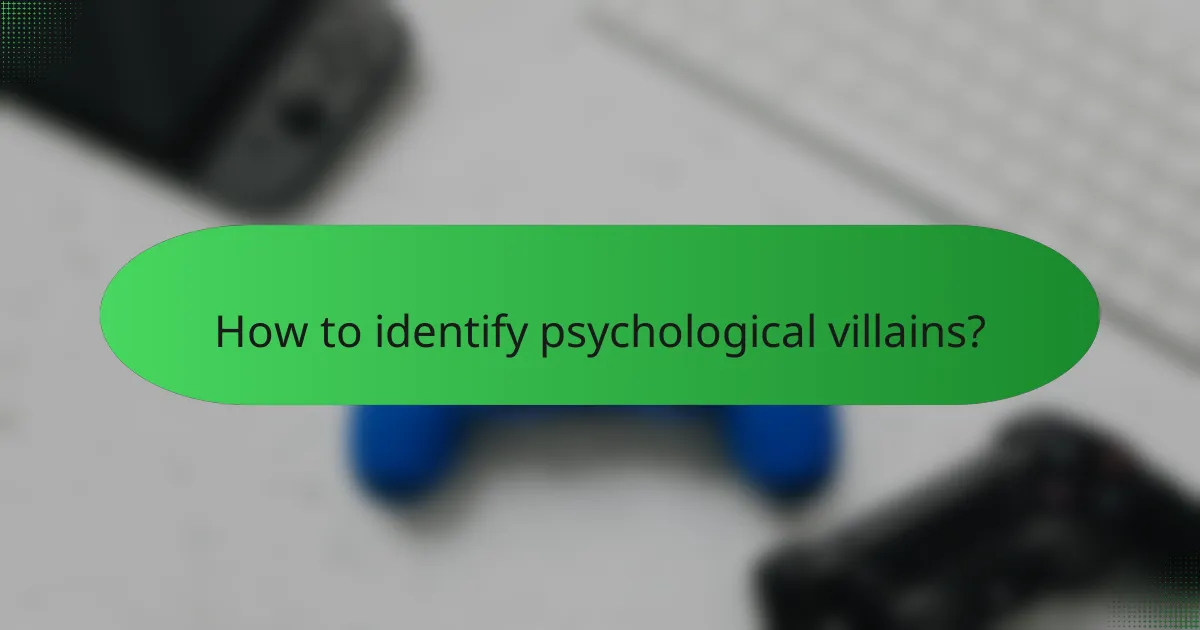
How to identify psychological villains?
Psychological villains are individuals who use mind games and emotional manipulation to control others. Identifying them involves recognizing specific traits, common tactics, and their ability to exploit fears.
Traits of emotional manipulators
Emotional manipulators often exhibit a range of distinct traits. They may display charm and charisma initially, making it easy to trust them. However, they frequently lack empathy, showing little regard for the feelings of others.
Another common trait is inconsistency in their behavior. They might alternate between kindness and cruelty, keeping their targets off balance and confused. This unpredictability is a hallmark of their manipulative nature.
Common mind games used
Psychological villains employ various mind games to maintain control. Gaslighting is one of the most insidious tactics, where they make their victims doubt their reality or perceptions. This can lead to significant self-doubt and confusion.
Another common tactic is the silent treatment, where the manipulator withdraws communication to punish or control the other person. This can create feelings of anxiety and desperation, pushing the victim to seek approval and reconciliation.
Recognizing fear exploitation
Fear exploitation occurs when manipulators leverage their targets’ insecurities or fears to gain power. They may identify specific fears, such as fear of abandonment or failure, and use these to manipulate decisions or actions.
To recognize this, pay attention to how discussions about your fears are handled. If someone frequently brings up your vulnerabilities to gain compliance or control, it’s a strong indicator of psychological manipulation.
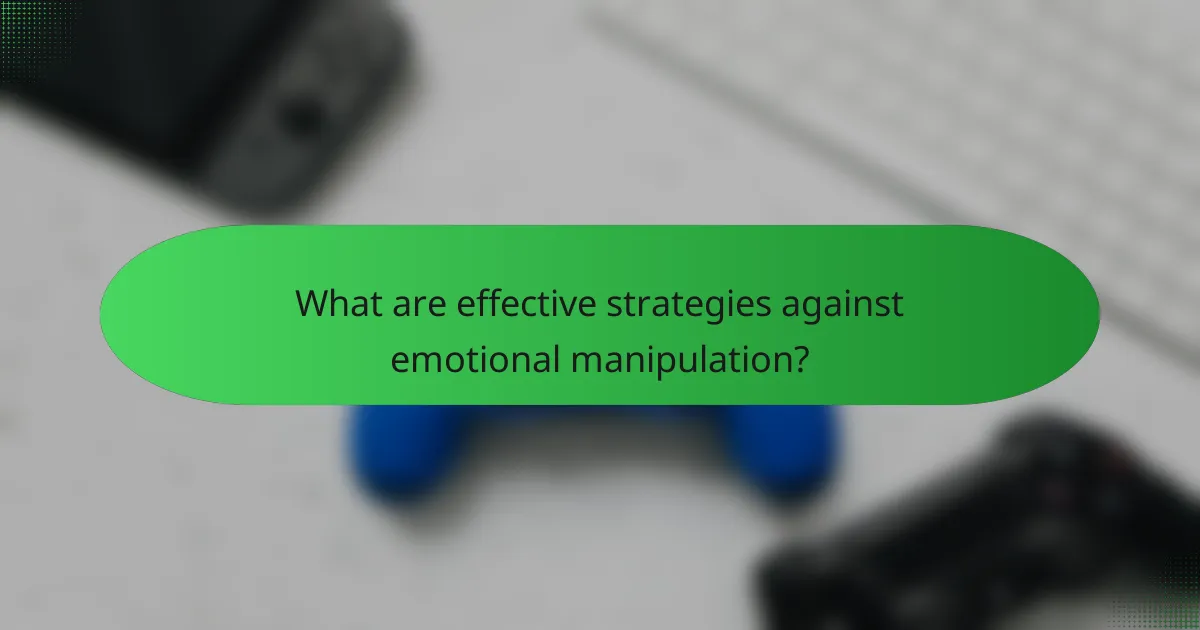
What are effective strategies against emotional manipulation?
Effective strategies against emotional manipulation include setting personal boundaries, building self-awareness, and seeking professional help. These approaches empower individuals to recognize and counteract manipulative behaviors, fostering healthier relationships.
Setting personal boundaries
Setting personal boundaries is crucial in protecting oneself from emotional manipulation. Clearly defining what behaviors are acceptable and unacceptable helps to establish limits that others must respect. For example, if someone frequently pressures you to make decisions quickly, you can assert that you need time to think before responding.
Communicate your boundaries assertively and consistently. This may involve saying “no” when necessary and standing firm against attempts to cross those limits. Remember, it’s essential to prioritize your emotional well-being.
Building self-awareness
Building self-awareness involves understanding your own emotions, triggers, and vulnerabilities. By recognizing how you respond to certain situations, you can better identify when someone is attempting to manipulate you emotionally. Journaling or reflecting on past interactions can help clarify your feelings and reactions.
Consider practicing mindfulness techniques to enhance your self-awareness. Techniques such as meditation or deep breathing can help you stay grounded and focused, making it easier to spot manipulative tactics when they arise.
Seeking professional help
Seeking professional help can provide valuable support in dealing with emotional manipulation. Therapists or counselors can offer strategies tailored to your specific situation, helping you develop coping mechanisms and improve your emotional resilience. They can also assist in unpacking any underlying issues that may make you more susceptible to manipulation.
Look for licensed professionals who specialize in emotional or psychological abuse. Many therapists offer sliding scale fees or accept insurance, making it more accessible to seek help. Engaging with a professional can be a significant step toward reclaiming your emotional autonomy.
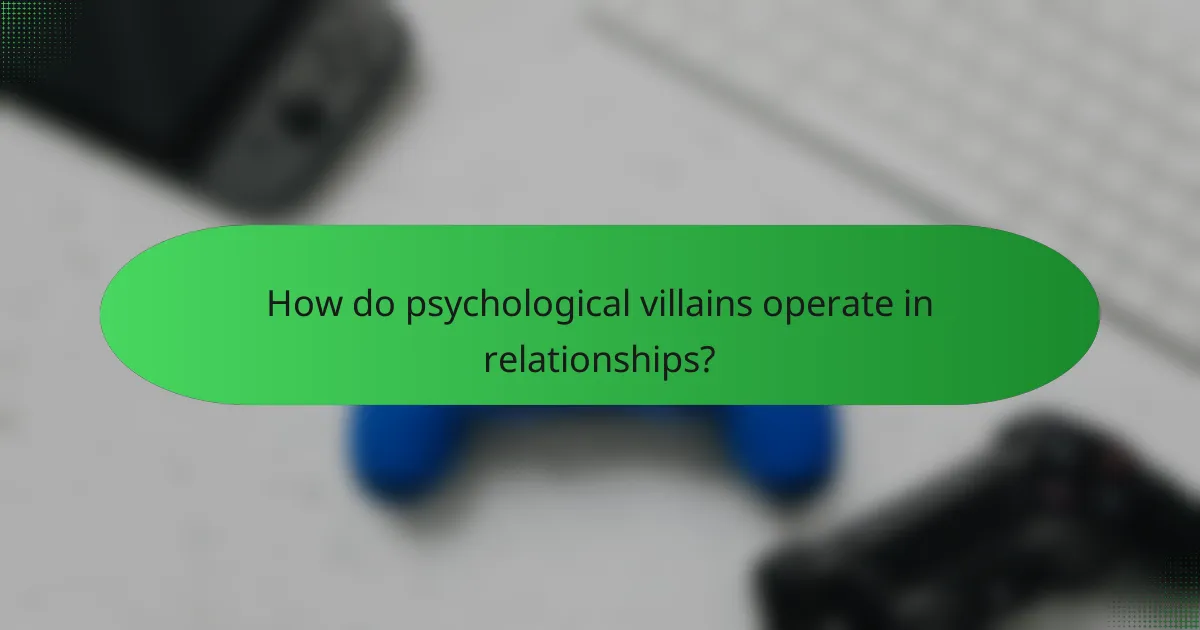
How do psychological villains operate in relationships?
Psychological villains manipulate emotions and exploit vulnerabilities to control their partners. They use tactics that create dependency and fear, often leading to unhealthy dynamics in relationships.
Manipulation tactics in romantic relationships
Common manipulation tactics include gaslighting, where the villain makes the victim doubt their perceptions and reality. They may also employ guilt-tripping, making their partner feel responsible for the villain’s emotions or actions.
Another tactic is love bombing, where the villain overwhelms the partner with affection and attention initially, only to withdraw it later, creating confusion and insecurity. These methods can create a cycle of emotional highs and lows that keeps the victim engaged and dependent.
Impact on mental health
Being involved with a psychological villain can lead to significant mental health issues, including anxiety, depression, and low self-esteem. The constant emotional turmoil can result in feelings of worthlessness and isolation.
Victims may experience chronic stress, which can manifest physically and emotionally, leading to exhaustion and a sense of hopelessness. Recognizing these impacts is crucial for seeking help and breaking free from toxic relationships.
Signs of toxic friendships
In toxic friendships, signs include consistent negativity, where the friend frequently criticizes or belittles you. They may also exhibit possessiveness, trying to control whom you spend time with or how you feel.
Another red flag is emotional unavailability, where the friend shows little interest in your feelings or experiences. If you often feel drained or anxious after interactions, it may indicate a toxic dynamic that needs to be addressed.
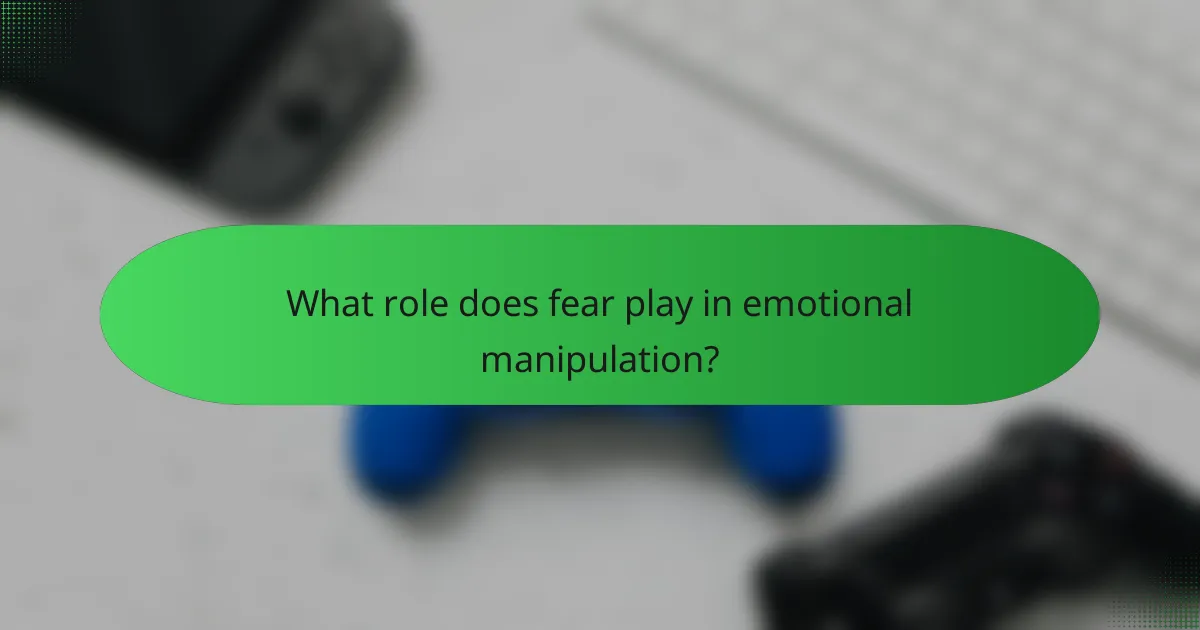
What role does fear play in emotional manipulation?
Fear is a powerful tool in emotional manipulation, as it can distort perceptions and influence behaviors. Manipulators often exploit individuals’ fears to gain control, leading to compliance or submission.
Types of fears exploited
Common fears exploited in emotional manipulation include fear of rejection, fear of failure, and fear of the unknown. Manipulators may leverage these fears to create a sense of urgency or dependency, making their targets more susceptible to influence.
For example, a manipulator might threaten to withdraw affection to exploit the fear of rejection, compelling the victim to act in ways that align with the manipulator’s desires. Similarly, instilling a fear of failure can pressure individuals to conform to expectations, often at the cost of their own values.
Psychological effects of fear manipulation
The psychological effects of fear manipulation can be profound, leading to anxiety, low self-esteem, and a distorted self-image. Victims may experience chronic stress, which can manifest in physical symptoms such as headaches or fatigue.
Additionally, prolonged exposure to fear-based manipulation can result in learned helplessness, where individuals feel powerless to change their circumstances. This can create a cycle of dependence on the manipulator, further entrenching the emotional control.
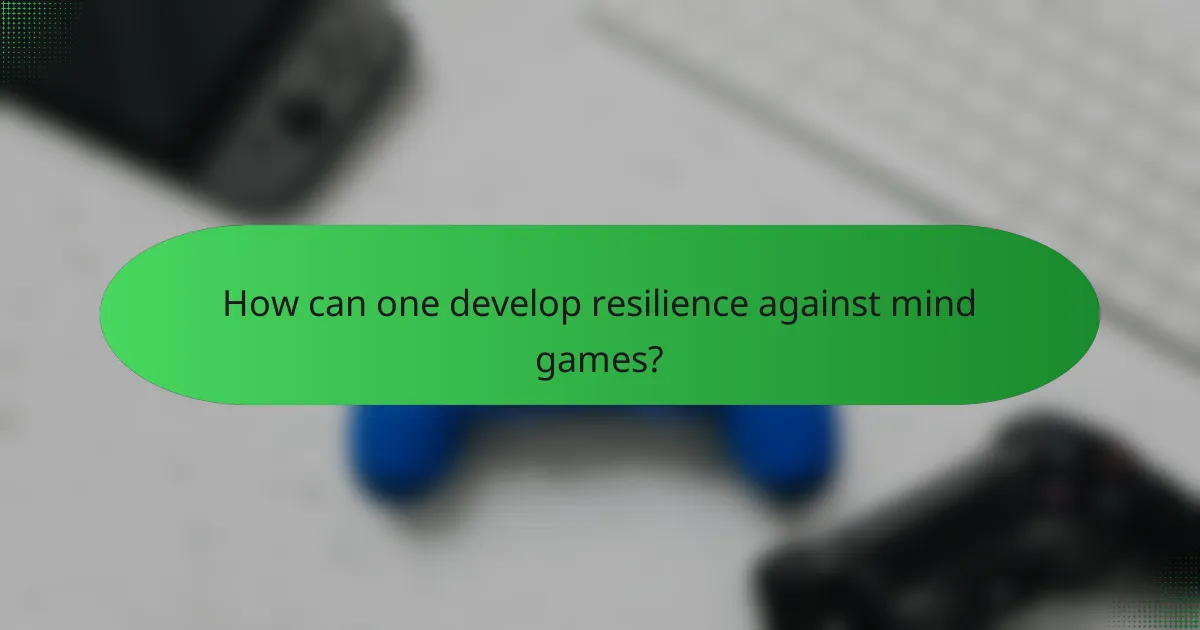
How can one develop resilience against mind games?
Developing resilience against mind games involves recognizing manipulative tactics and strengthening your mental defenses. This can be achieved through assertiveness and enhancing emotional intelligence, which help you respond effectively to emotional manipulation.
Practicing assertiveness
Assertiveness is the ability to express your thoughts and feelings confidently while respecting others. By practicing assertiveness, you can set clear boundaries that deter emotional manipulators. Start with simple statements like “I feel uncomfortable when…” to communicate your needs effectively.
Role-playing scenarios can help build your assertiveness skills. Consider practicing with a trusted friend or in front of a mirror. Remember, assertiveness is about being direct without being aggressive, which fosters respect in your interactions.
Enhancing emotional intelligence
Emotional intelligence (EI) involves understanding your own emotions and those of others. By improving your EI, you can better recognize when someone is attempting to manipulate your feelings. This awareness allows you to respond thoughtfully rather than react impulsively.
To enhance your emotional intelligence, engage in self-reflection and mindfulness practices. Journaling about your emotional experiences can help you identify patterns and triggers. Additionally, actively listening to others can improve your empathy, making it harder for manipulators to exploit your vulnerabilities.
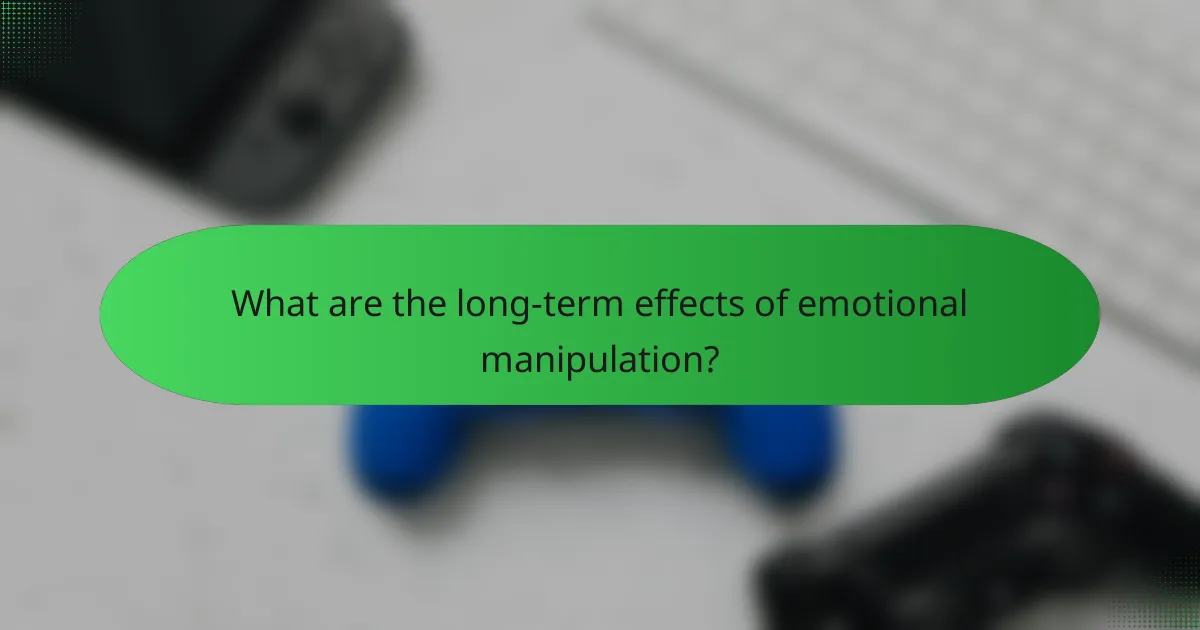
What are the long-term effects of emotional manipulation?
The long-term effects of emotional manipulation can be profound, leading to lasting damage in various aspects of a person’s life. Victims often experience diminished self-worth, difficulties in future relationships, and a persistent sense of distrust towards others.
Impact on self-esteem
Emotional manipulation can severely undermine a person’s self-esteem, making them question their worth and abilities. Over time, this can lead to chronic feelings of inadequacy and self-doubt, as the victim internalizes the manipulator’s negative messages.
For example, someone who has been consistently criticized may develop a belief that they are incapable of achieving their goals. This diminished self-esteem can manifest in various ways, such as avoiding challenges or feeling unworthy of love and respect.
Effects on future relationships
The scars of emotional manipulation can carry over into future relationships, often resulting in trust issues and fear of vulnerability. Victims may find it challenging to open up to new partners, fearing that they will be manipulated again.
Additionally, they might unconsciously replicate unhealthy patterns, either by becoming overly submissive or by exhibiting controlling behaviors themselves. Recognizing these patterns is crucial for healing and building healthier connections in the future.
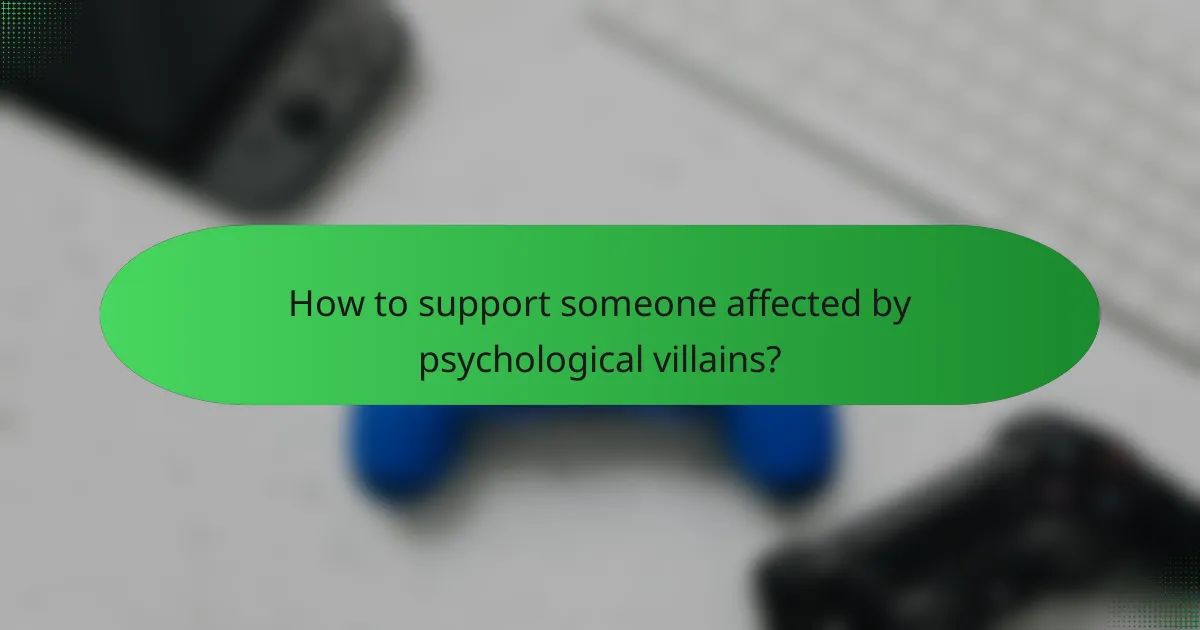
How to support someone affected by psychological villains?
Supporting someone impacted by psychological villains involves understanding their emotional struggles and providing a safe space for them to express their feelings. It’s crucial to be patient and empathetic, as they may be dealing with deep-seated fears and manipulation.
Providing emotional support
Emotional support is vital for individuals affected by psychological manipulation. Listening without judgment allows them to share their experiences and feelings openly. Validate their emotions by acknowledging their pain and confusion, which can help them feel understood.
Encourage them to express their thoughts and fears. Simple phrases like “It’s okay to feel this way” or “You’re not alone” can be comforting. Avoid offering quick fixes or dismissing their feelings, as this may reinforce their sense of isolation.
Additionally, suggest engaging in activities that promote mental well-being, such as mindfulness exercises or journaling. These practices can help them regain a sense of control and clarity, aiding in their recovery from emotional manipulation.
